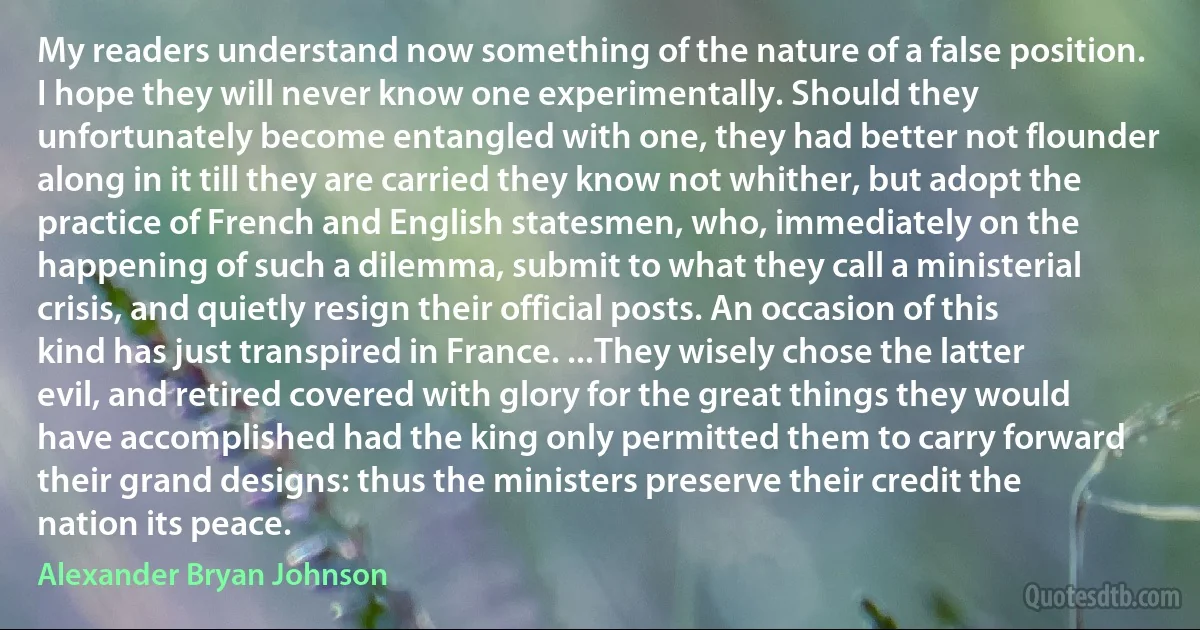
My readers understand now something of the nature of a false position. I hope they will never know one experimentally. Should they unfortunately become entangled with one, they had better not flounder along in it till they are carried they know not whither, but adopt the practice of French and English statesmen, who, immediately on the happening of such a dilemma, submit to what they call a ministerial crisis, and quietly resign their official posts. An occasion of this kind has just transpired in France. ...They wisely chose the latter evil, and retired covered with glory for the great things they would have accomplished had the king only permitted them to carry forward their grand designs: thus the ministers preserve their credit the nation its peace.
Alexander Bryan JohnsonRelated topics
call carry chose credit english evil false flounder forward french glory great hope kind king ministerial nation nature now occasion peace position practice preserve should something thus till thingsRelated quotes
Have not many of us, in the weary way of life, felt, in some hours, how far easier it were to die than to live?
The martyr, when faced even by a death of bodily anguish and horror, finds in the very terror of his doom a strong stimulant and tonic. There is a vivid excitement, a thrill and fervor, which may carry through any crisis of suffering that is the birth-hour of eternal glory and rest.
But to live, - to wear on, day after day, of mean, bitter, low, harassing servitude, every nerve dampened and depressed, every power of feeling gradually smothered, - this long and wasting heart-martyrdom, this slow, daily bleeding away of the inward life, drop by drop, hour after hour, - this is the true searching test of what there may be in man or woman.

Harriet Beecher Stowe
The evil forces which are now attacking South Korea are part of a world-wide conspiracy against the way of life of the free democracies. Communists...are...engaged in an attempt to mould the whole world to their pattern of tyranny. They seek to sweep democracy and liberty from the world. They are ready to destroy our lives if we don't agree with them. They talk of freedom while they murder it. They talk of peace while they support aggression. They are ruthless and unscrupulous hypocrites who pretend to virtues which their philosophy rejects. The trouble is that quite a lot of well-meaning people are taken in by the Communists and their sham peace propaganda. What is happening in Korea should open their eyes.

Clement Attlee
June 7, 1776, Richard Henry Lee, on behalf of the Virginia delegation, submitted to the Continental Congress three resolutions, of which the first declared that "these United Colonies are, and of right ought to be, free and independent States, that they are absolved from all allegiance to the British Crown, and that all political connection between them and the State of Great Britain is, and ought to be, totally dissolved. This resolution, which may conveniently be called the Resolution of Independence, was finally voted by the Continental Congress on the 2 of July, 1776. Strictly speaking, this was the official declaration of independence; and if we were a nation of antiquaries we should no doubt find an incongruity in celebrating the anniversary of our independence on the 4 of July.

Carl L. Becker
England and France, the two most civilized nations on earth, who are in contrast to each other because of their different characters, are, perhaps chiefly for that reason, in constant feud with one another. Also, England and France, because of their inborn characters, of which the acquired and artificial character is only the result, are probably the only nations who can be assumed to have a particular and, as long as both national characters are not blended by the force of war, unalterable characteristics. That French has become the universal language of conversation, especially in the feminine world, and that English is the most widely used language of commerce among tradesmen, probably reflects the difference in their continental and insular geographic situation.

Immanuel Kant
Intellectual leadership in the eighteenth century passes from France to economically, socially and politically more progressive England. The great romantic movement starts here about the middle of the century, but the enlightenment also receives its decisive impulse from this country. The French writers of the period see in English institutions the quintessence of progress and build up a legend around English liberalism-a legend which only partly corresponds to reality. The displacement of France as the upholder of culture by England proceeds hand in hand with the decadence of the French royal house as the leading European power and, hence, the eighteenth century sees the ascent of England both in politics and in the arts and sciences.

Arnold Hauser
